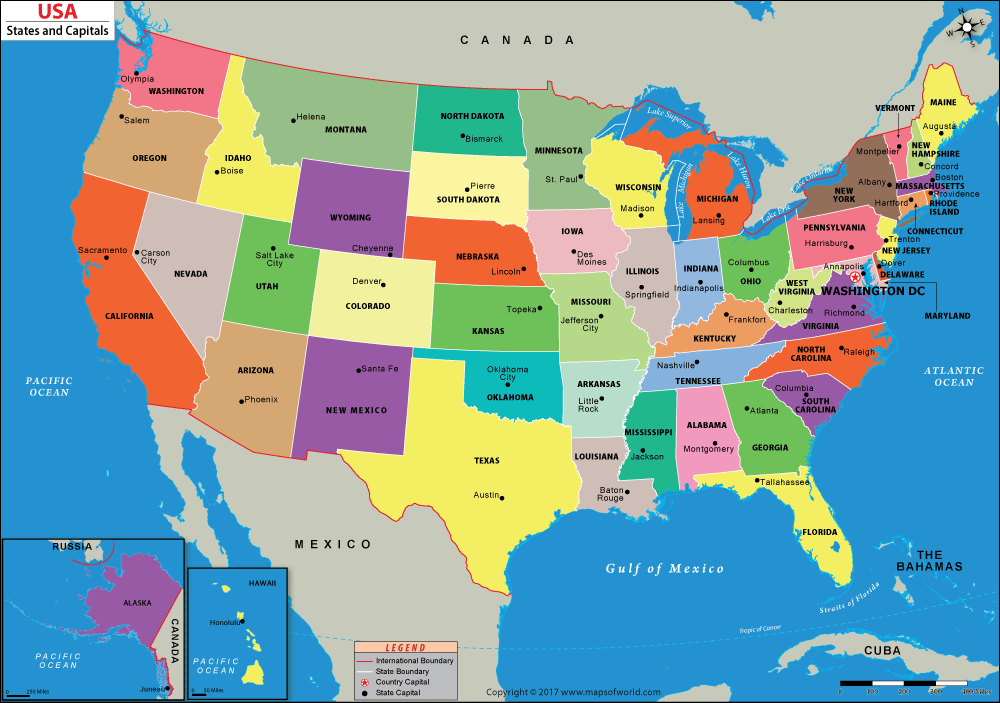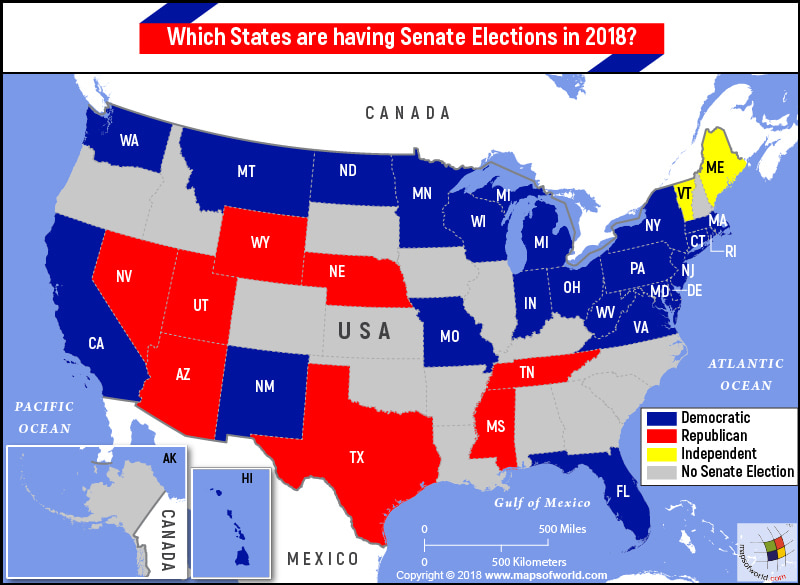What States are having Senate Elections in 2018?
Senate elections will be held on November 6, 2018, when 33 seats of the 100 seats will be contested along with one seat through a special election. The elected class-1 Senators would serve for a term of six years beginning January 3, 2019, to January 3, 2025. Minnesota is the state having Special election for Senator seat in 2018, since Democratic Senator Al Franken resigned and Lt. Governor Tina Smith (D) was appointed as Interim Senator by the Governor.
The states holding the Senate elections are:
| State | Incumbent | Party |
|---|---|---|
| Arizona | Jeff Flake | Republican |
| Connecticut | Chris Murphy | Democratic |
| California | Dianne Feinstein | Democratic |
| Delaware | Tom Carper | Democratic |
| Florida | Bill Nelson | Democratic |
| Hawaii | Mazie Hirono | Democratic |
| Indiana | Joe Donnelly | Democratic |
| Maine | Angus King | Independent |
| Maryland | Ben Cardin | Democratic |
| Massachusetts | Elizabeth Warren | Democratic |
| Michigan | Debbie Stabenow | Democratic |
| Minnesota | Amy Klobuchar | Democratic |
| Mississippi | Roger Wicker | Republican |
| Montana | Jon Tester | Democratic |
| Missouri | Claire McCaskill | Democratic |
| Nebraska | Deb Fischer | Republican |
| Nevada | Dean Heller | Republican |
| New Mexico | Martin Heinrich | Democratic |
| New Jersey | Bob Menendez | Democratic |
| New York | Kirsten Gillibrand | Democratic |
| North Dakota | Heidi Heitkamp | Democratic |
| Ohio | Sherrod Brown | Democratic |
| Rhode Island | Sheldon Whitehouse | Democratic |
| Pennsylvania | Bob Casey Jr. | Democratic |
| Texas | Ted Cruz | Republican |
| Tennessee | Bob Corker | Republican |
| Utah | Orin Hatch | Republican |
| Vermont | Bernie Sanders | Independent |
| Virginia | Tim Kaine | Democratic |
| Washington | Maria Cantwell | Democratic |
| Wyoming | John Barrasso | Republican |
| Wisconsin | Tammy Baldwin | Democratic |
| West Virginia | Joe Manchin | Democratic |
Why is the Senate election in 2018 so important?
In the Senate, the Republican Party holds the majority with 51 seats, the Democratic Party 47 seats, and Independents hold two seats and caucus with the Democratic Party. The Democratic Party requires two seats to get back the majority they lost in 2014, and so the Republican Party can be expected to defend their majority aggressively. The November elections will be a close contest.
The elections hold a more significant challenge for the Democratic Party as they will be defending 25 seats, including the two independent seats in their favor. The Republicans have to defend just eight seats.
The Challenge
Nine states have a Democratic incumbent but were won by Donald Trump.
The Democratic Party will have to overcome the Republican challenge in nine states where the incumbent is Democratic, but the state was won by Donald Trump during the 2016 elections. These states are:
- Florida
- Ohio
- Montana
- Pennsylvania
- Wisconsin
- West Virginia
- North Dakota
- Michigan
- Missouri
Nevada is the only state won by Hilary Clinton in 2016 where the incumbent was a Republican. There are over 13 states with a Democratic incumbent having a Republican Governor.
The Democratic Party will face a strong challenge from the Republican Party in these states where the Governor is a Republican.
The states are:
- Florida
- Ohio
- Maine
- New Mexico
- Missouri
- Massachusetts
- Indiana
- North Dakota
- Vermont
- New Jersey
- Wisconsin
- Maryland
- Michigan
Two states with a Republican incumbent
The Republican Party will have to defend these two states where the Democratic Party is expected to mount a strong challenge. The states are:
- Arizona
- Nevada
There are no states with a Republican incumbent and Democratic governor
The advantage lies with the Republican Party since they have to defend lesser seats than the Democratic Party.
Visit the following to learn more about the USA:
Related Maps:








